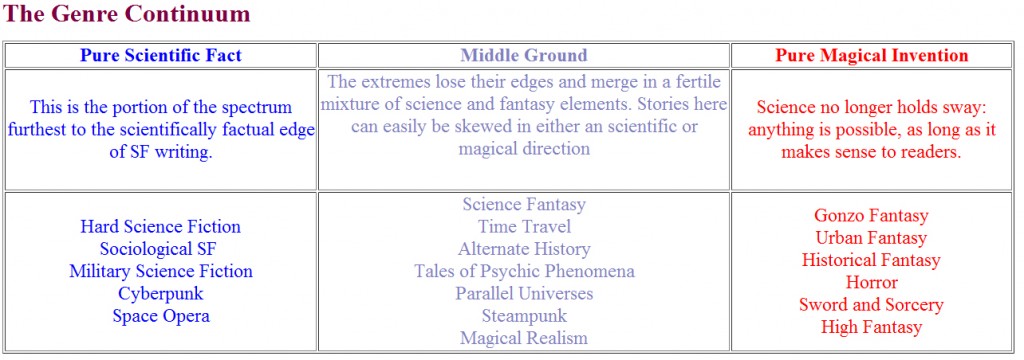Every SF story has one thing in common–at its heart is an element of the fantastic that cannot be removed without killing the piece.
Aside from that, all bets are off. A story can be about witches, astronauts, or time travelers; it can be about aliens, superheroes, magic sentient dogs, or a U.S. President with an improbable name like, say… Oprah Winfrey.
The nature of the fantastic element in a given story is a key (though not the only) element in determining what genre you are writing in. If your story features wand-wielding wizards and noble, horseback-riding swordsmen, you are probably writing high fantasy. If it is the tale of some ultra-cool VR hackers using technology that modern society may well invent in another six months, odds are it’s cyberpunk. Though genres in speculative fiction are primarily marketing distinctions, they are also distinct art forms with their own conventions and styles. Whenever possible it is a good idea to at least know something about the type of story you are writing. You may not choose to follow the conventional rules of that genre, you may even mix and match between genres… but you should always be making an informed choice to break the established rules.
For detailed breakdowns of genre definitions, check here:
Literary agent Jennifer Laughran defines the genres and categories beautifully in this blog post.
Other Worlds Writer’s Workshop
Or try Wikipedia, which an article on science fiction genres, and more on fantasy subgenres than you will ever need to absorb.
It’s important to remember that no SF universe is free of some magical element–no matter how believable our speculation is, what makes a story SF is the inclusion of technologies or social conditions currently beyond our present-day experience. Similarly, no fantasy universe is free of science–almost nobody writes of magical realms where simple physical realities like gravity and fire don’t operate normally. The further to the SF side of the spectrum your story lies, the more you will want to extrapolate plausible technological details for your setting. Far across the continuum on the fantasy side, you might create a magical system that requires equally rigorous treatment as you set out its rules and limitations.

Though the middle-ground genres are most flexible, any piece of fiction across the Science-Magic continuum can be presented in a way that skews it closer to one end or the other, depending on the language used, the amount of technical explanation devoted to making the impossible story elements plausible, the types of characters and the overall treatment of the impossible. A few examples:
Anne McCaffrey’s The Dragonriders of Pern novels read like fantasy in every way… but they are SF. The settlers of Pern are offworld colonists, and the dragons are genetically engineered.
novels read like fantasy in every way… but they are SF. The settlers of Pern are offworld colonists, and the dragons are genetically engineered.
In a film like The Matrix , virtual reality is a magical realm where anything can happen and a privileged few have genuine superpowers. Meanwhile, the “real” world has a dystopian cyberpunk gloss.
, virtual reality is a magical realm where anything can happen and a privileged few have genuine superpowers. Meanwhile, the “real” world has a dystopian cyberpunk gloss.
In the science fantasy novel Channeling Cleopatra by Elizabeth Ann Scarborough, discovery of Cleopatra’s tomb and corpse allows scientists to inject her genetic material into a test subject… who then becomes possessed by Cleo’s spirit. What could have been a simple psychic-phenomena novel is thus given SF overtones.
by Elizabeth Ann Scarborough, discovery of Cleopatra’s tomb and corpse allows scientists to inject her genetic material into a test subject… who then becomes possessed by Cleo’s spirit. What could have been a simple psychic-phenomena novel is thus given SF overtones.
The important element to consider is this: regardless of where you place your story on the science-magic continuum, you will have to create an internally consistent world, whether by researching plausible scientific advances, extrapolating sociological trends, or inventing something from whole cloth.
QUESTIONS TO ASK YOURSELF WHEN CHOOSING A GENRE TO WORK IN…
- What do you like to read?
- What are your favorite genres of speculative fiction? What do you love most about them?
- Who are your favorite authors and which of their stories have affected you most strongly?
- What kind of story are you trying to tell?
- What kind of reader are you trying to speak to?
- What sort of magazine or anthology can you imagine your story appearing in?
- What are the artistic and storytelling conventions of that subgenre?
- What element of the impossible will your story contain? Will your story fall apart without it?



